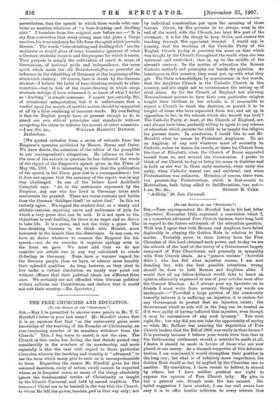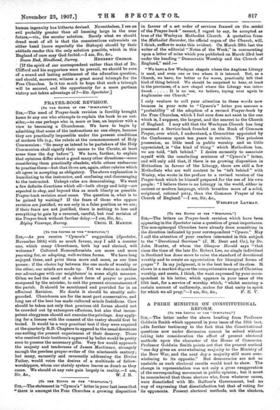[To THE EDITOR or THE "SPECTATOR:1 SIR, —Your correspondent Mr. Horsfall
has in his last letter (Spectator, November 16th) expressed a conviction which I, as a somewhat advanced Free Church layman, have long held in regard to the future settlement of the education question. With him I agree that both Roman and Anglican have failed deplorably in obeying the Golden Rule in relation to this matter. Probably never in their history have the Free Churches of this land obtained such power, and to-day we see the schools of the land at the mercy of a Government largely composed of Free Churchmen, and generally in sympathy with Free Church ideals. As a "passive resister" (horribile dictu !) who has felt what injustice means, I am now dreading lest, with the best possible intentions, wrong should be done to both Roman and Anglican alike. I would that all my fellow-Liberals would take to heart an opinion admirably expressed in one of your articles soon after the General Election. As I always post my Spectator on to friends I must write from memory, though my words are inadequate:—" Provided a large portion of the community honestly believes it is suffering an injustice, it is useless for any Government to protest that no injustice exists ; the Government which so acts will in the long run be treated as if it were guilty of having inflicted that injustice, even though it may be unconscious of any such tyranny." You were right, Sir ; but why did you not take the opportunity of saying so when Mr. Balfour was assuring the deputation of Free Church leaders that the Bill of 1902 was really in their favour? It is precisely because I believe your words were true that in the forthcoming settlement, should a mistake be made at all, I desire it should be made in favour of those who are now placed at our mercy. As a staunch supporter of this Adminis- tration, I am convinced it would strengthen their position in the long run ; but what is of infinitely more importance, the Golden Rule would at last be applied by the Churches one to another. My conviction, I have reason to believe, is shared by others, but I have neither position nor right to express the opinion of Free Church laity. My plea is but a general one, though none the less earnest. De- tailed suggestion I have avoided; I am too well aware how easy it is to offer hostile criticism to every scheme that
human ingenuity has hitherto devised. Nevertheless, I see an evil probably greater than all looming large in the near future,—viz., the secular solution. Surely what we should dread most of all is that the conscientious extremists on either hand (more especially the Bishops) should by their attitude render this the only solution possible, which in this England of ours may God forbid.—I am, Sir, &c., [If the spirit of our correspondent rather than that of Dr. Clifford and his supporters were to prevail, we should be sure of a sound and lasting settlement of the education question, and should, moreover, witness a great moral triumph for the Free Churches. Is it too much to hope that such a triumph will be secured, and the opportunity for a mere partisan victory not taken advantage of P—ED. Spectator.]



















































 Previous page
Previous page